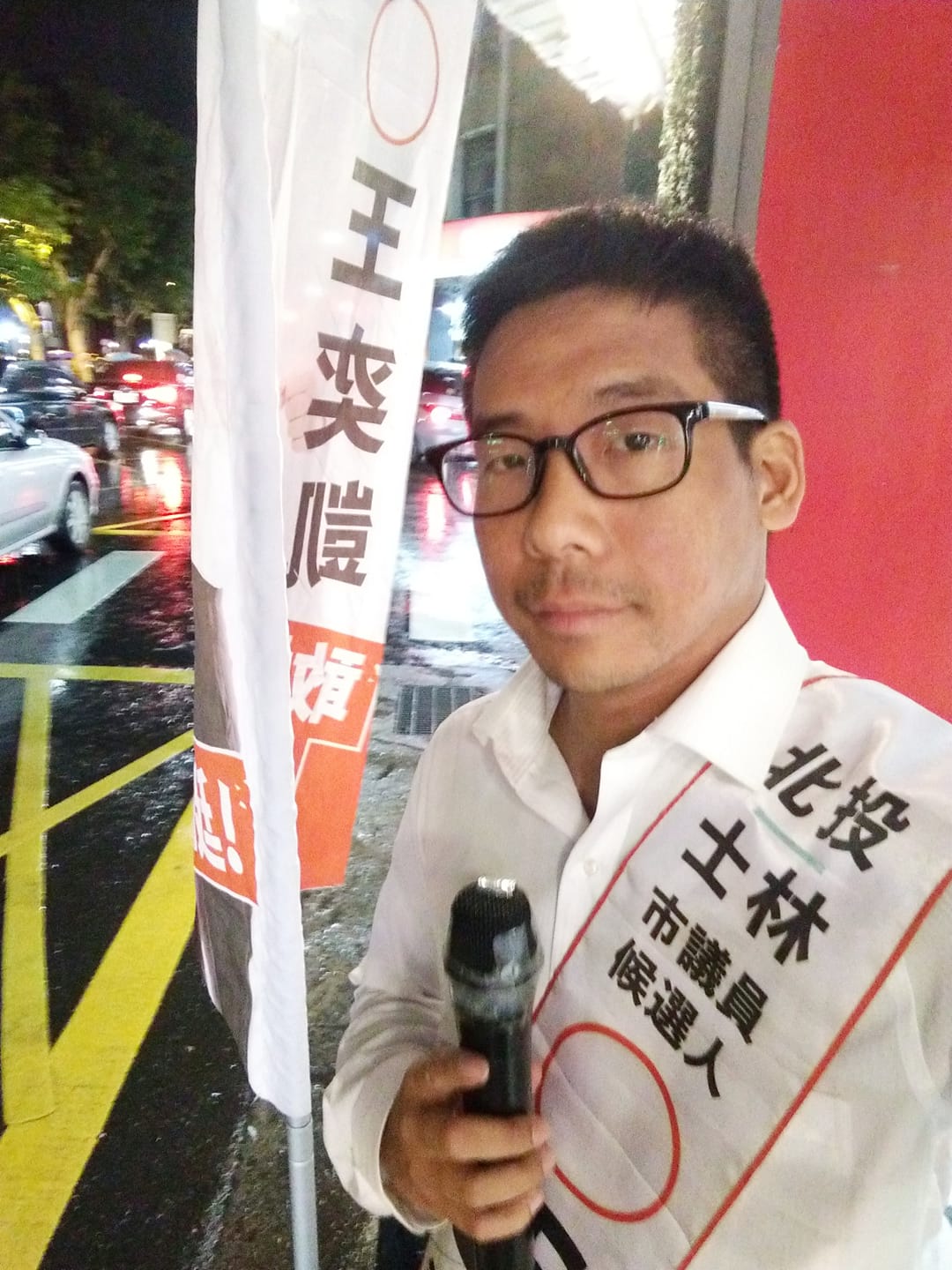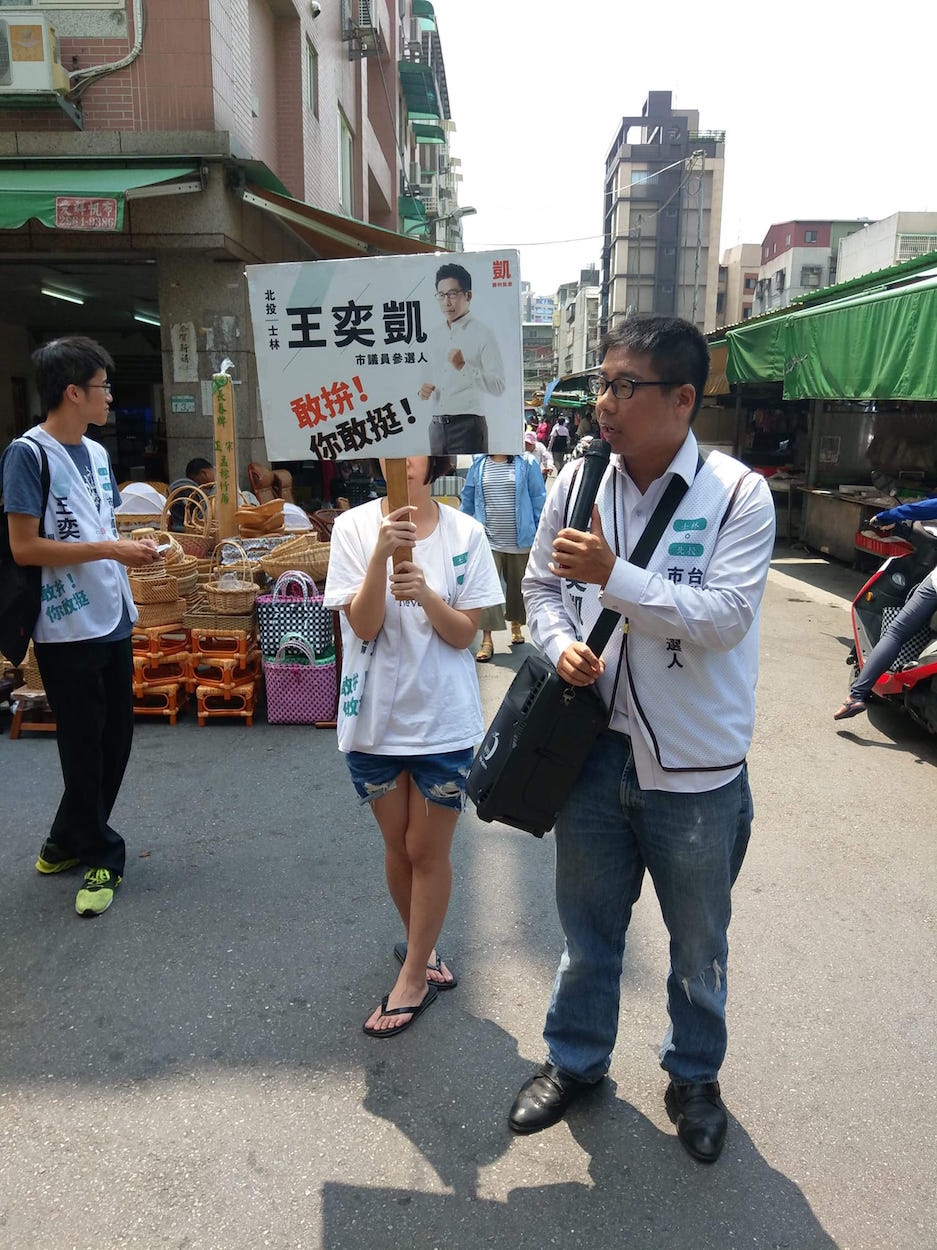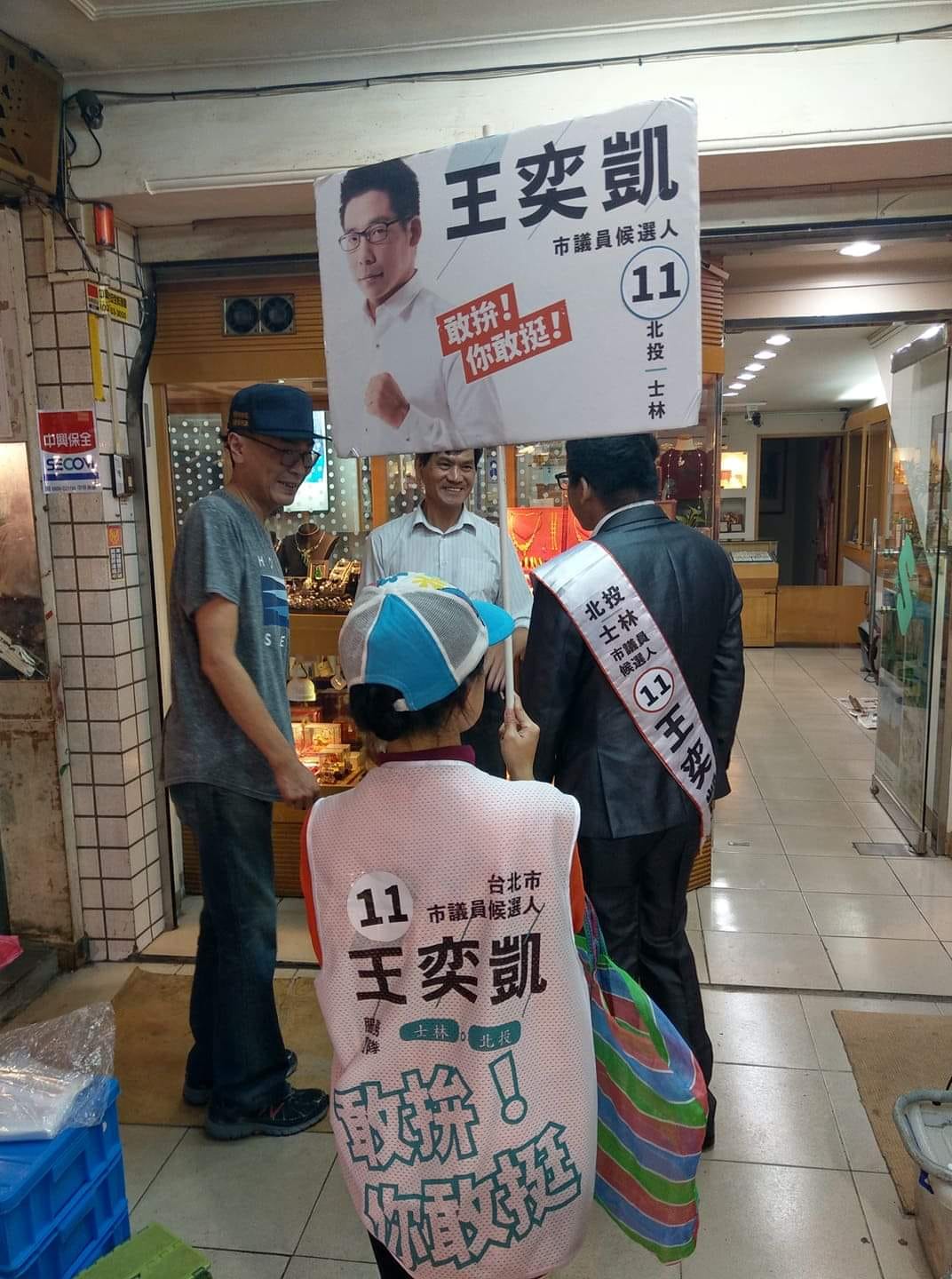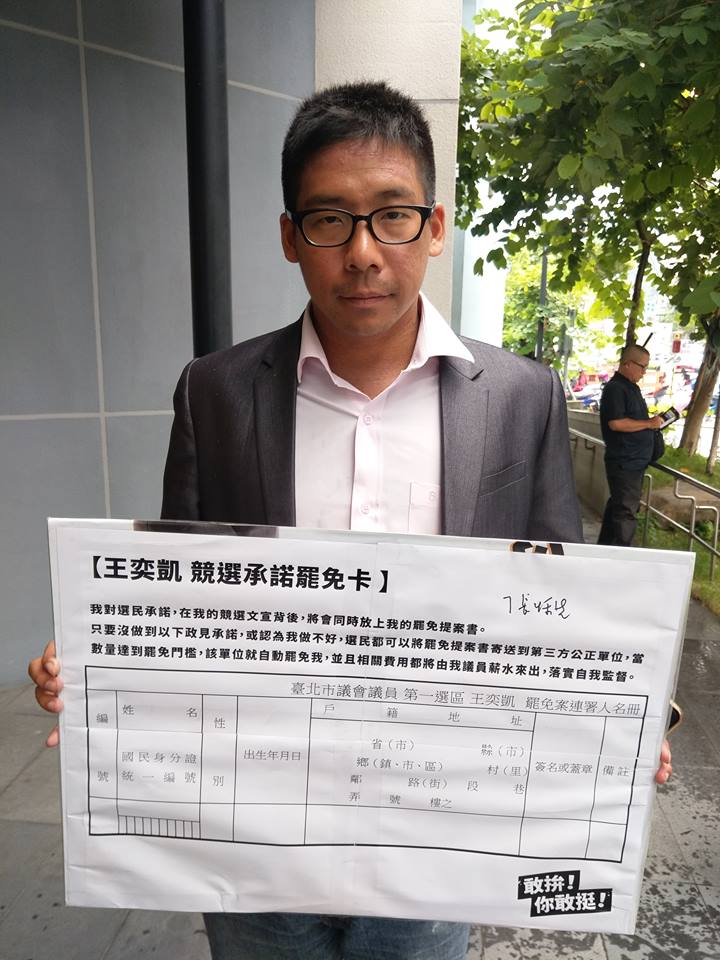by Brian Hioe
語言:
English /// 中文
Photo credit: 青年外交官 劉仕傑/Facebook
Translator: Brian Hioe
On September 30th, New Bloom editor Brian Hioe interviewed independent candidate Wang Yikai, who is running in the Shilin-Beitou area of Taipei. This is part of New Bloom’s ongoing series of interviews with independent city councilor candidates, as part of its special 2018 election coverage.
Brian Hioe: Can you first introduce yourself for readers who might not know you?
Wang Yikai: I am Wang Yi-kai. I was born in 1985. I am currently running for city council in Taipei. As for my background, I studied philosophy in college but dropped out after four years. Outside of this, I am a supervisor at the Taiwan UN Alliance, a board member at the Taiwan Association for Human Rights, and, as international readers may know better, a board member at the Shilin Night Market Tourism Development Agency.
In the past, I have been a participant in social movements. As a college student, the earliest social movement I participated in was the Wild Strawberry Movement in 2008, protesting Ma Ying-Jeou and the premier when Chen Yunlin visited Taiwan and they carried out restrictive actions on fellow citizens, such as confiscating the ROC flag, or police beating up citizens. We called for an apology for these actions. I and some college students started the Wild Strawberry Movement, and started an occupation Liberty Plaza that lasted for thirty-something days. So at that time, I began to participate in social movements.
 Photo credit: 北投士林‧王奕凱/Facebook
Photo credit: 北投士林‧王奕凱/Facebook
After leaving school and dropping out, I entered society. Apart from being an average office worker, I also worked in the finance industry and set up a stall in the Shilin night market. When I had time, I would participate in social movements. Because I was concerned with social issues, outside of discovering that social inequality was very high, and I also became that Taiwan’s democracy movement was lacking in many aspects. In 2014
This continued up until 2014, when because my friends were very concerned with the CSSTA, with Taiwan set to sign a bilateral trade agreement with China. We were very worried about this, that this would open the door to Chinese influence, and wanted to block this. So we participated in what later became known as the Sunflower Movement, in which we occupied the Legislative Yuan, hoping to block this and the review process for the bill.
At the time, I became known in the media because I didn’t agree with how the decision to withdraw was arrived at by the core decision-making group in the Legislative Yuan, which led to me rushing the stage when they were announcing the withdrawal. From then on, that was when the media began to take note of meet. The same year after the withdrawal, I decided to participate in Taipei city council elections, because I had originally participated in Taiwanese independence organizations, and they hoped to promote pro-independence young people running for office. As a result, I participated in 2014 Taipei city council elections as an independent, although in the end I lost by two to three thousand votes.
This are some of my experiences. In the course of these years, apart from deciding to run again for city council, I have done some other things. For example, I helped to begin a movement to oppose to power held by the wealthy in Taiwan, targeting the KMT in particular so that they would not keep winning elections, and I also began a satirical contest to apologize to China, since China continues to claim that its feelings are hurt for many actions targeting China and demands apologies. So we began a satirical contest to mock them.
I later also worked in the Legislative Yuan, as a legislative assistant. After leaving this, for two years I prepared to run for elections. There are fifty days left before elections now. This is my background.
BH: You began from a background in social movements, then decided to run for office. Why did you decide this?
WY: I decided to run because, in consideration of Taiwan’s democracy movement and its political circumstances, it wasn’t enough to try and resolve Taiwan’s problems only through social movements. We want to address issues including environmental issues, Taiwanese sovereignty, human rights in Taiwan, gender and sexuality, but with these issues, even if you need to call for changes, it’s almost as if you are just praying to elected politicians in the hopes that they will answer you. If these politicians don’t identify with your views, then you have no way of getting changes done.
With some social issues, you discover that Taiwanese society supports a cause. For example, although you may not have an absolute majority, over half of Taiwanese support marriage equality. However, not half of elected politicians do, and over half oppose marriage equality. Why would this kind of phenomenon come to be, that you have difficulty transforming social force to political power? The political process, which involves resources, allows there to be this environment of conservative political forces
So we have to enter elections. We can’t expect conservative social forces to push the changes we hope for. One reason why I would enter into elections this time because the last time I ran, I nearly won, losing only by two or three thousand votes. I got over 8000 votes. In participating in elections again, this is because this phenomenon has changed, and we haven’t seen new politicians able to produce change.
With society slowly realizing that their views aren’t being represented by their politicians, who are primarily a conservative force. Moreover, issues of social inequality have not been resolved. This is why I would decide to run, to try and seek the support of the people, to try and seek representation in the city council or the legislature, and to try and push for changes.
 Photo credit: 北投士林‧王奕凱/Facebook
Photo credit: 北投士林‧王奕凱/Facebook
BH: Why did you decide to run as an independent candidate, without any party?
WY: I originally decided to run as an independent because I didn’t feel that you necessarily have to have a party in running for elections. I hoped to be different from the major political parties when I ran, to begin with. Whether DPP or KMT, apart from differences on the issue of independence or unification, they are not different. The DPP may lean more towards independence on the issue of independence versus unification, but is not so different on issues. As a result, there were not parties I felt I could ally myself with. That was during the first time I ran.
The second time I ran, there were many new smaller parties that appeared, from the Sunflower generation. I didn’t originally decide to run as an independent, I originally hoped to have contact with these small parties and to participate in their election mechanisms, such as with the NPP or the SDP. But they couldn’t accommodate so many people in their election mechanism. I sought them out to see if they wanted to cooperate, but there were already candidates they had decided on internally. So in order to avoid interfering with other people’s arrangements, I decided to run again as an independent. I couldn’t run as a party’s candidate without their approval, after all, that would be quite strange.
BH: What do you think is different between yourself and other candidates? Who are your opponents and what kind of election strategy do you intend to pursue?
WY: We have more than one seat up for elections in city council elections in Taiwan. Our district has the most seats in Taipei. We also have the most people running.
We have a total of 23 city councilors in this area. We need to elect 13 seats. There are ten incumbents and there are a total of 13 new candidates who must either squeeze into those three seats or beat the incumbents. In this process, I emphasize my political views and advocacy. You can see that in this district, the candidates all advertise using their banners and billboards. But if you look carefully at my advertising, you’ll see that I’m the only candidate who puts their political views on my billboards. For example, you can see that other candidates might only have a slogan like, “I will goodheartedly support you,” “Dares to speak up, dares to take action,” or “What you can see, you can do.”
You’ll discover that of these candidates who have political slogan on their billboards, none of them discuss policy on their signs. As a result, you’ll find that I express directly that I advocate protecting the environment, oppose the development of Shanbodi, and call for the protection of the cultural heritage of the Shilin-Beitou area, and hope to promote tourism in the Shilin night market, as well as to resolve issues related to traffic congestion.
As for election strategy, I stand on the street to talk to as many people as possible. I may be more similar to a candidate running in Taoyuan in that regard, that we have many candidates who stand on street corners and wave their hands so that people get to know them. However, we stand on the street and give speeches, to let people at markets, or at subway stations, or riding on scooters to tell them the political views we advocate for.
In running as an independent, I lack the advantage a party has. The supporters of a party may vote for that party, although they don’t know the candidate, simply because they are supported by a party. I must devote more energy to allow voters to know that I can represent them. So I hope to use speeches to convey my ideals so that voters will come to support it, transcending parties. This is my strategy.
BH: What is different about yourself compared to other candidates? What is specific about yourself?
WY: One difference between myself and other candidates is that I focus on action. Whether with charging the Legislative Yuan during the Sunflower Movement, or appearing on television to discuss issues. Or opposing the changes to the Labor Standards Act and the yili yixiu policy pushed for by the DPP. Or protesting those who are pro-unification and hope for harm to Taiwan. Including with regards to the Sing! China incident at NTU. Or in terms of protecting the environment and opposing the development of Shanpodi and bringing local residents to protest this.
In this respect, as compared to other political newcomers, I have a history of this. The majority of candidates were picked by a party and less experience in social movements. This includes with Third Force parties, who were primarily shortlisted by their parties.
They do not begin social movement protest or actions on their own. We also have stronger local connections and connections with Taiwanese society. People remember me as a social movement activist, as someone that pushes for actions. The second specificity of mine is what I said earlier, that I prefer to give speeches on the streets. I think that in this election, only I am doing this in this election district.
 Photo credit: 北投士林‧王奕凱/Facebook
Photo credit: 北投士林‧王奕凱/Facebook
BH: What kind of challenges do you have to overcome in running?
WY: Our largest difficult is how to effectively allow citizens to know our political views. And to allow them to vote for me over others. This is difficult. We encounter supporters of the KMT or the DPP or other party members, and the contestation of the two parties influences how we are perceived. For example, supporters of the KMT know that we originate from the Sunflower Movement, and although they do not support the DPP, because they know that we oppose the political views of the KMT, they won’t listen to us. They might even stop and tell us that they despise us. This happens once or twice whenever we canvass. Sometimes they will quite directly say that they despise us because of the Sunflower Movement, or call us running dogs of Tsai Ing-Wen. I’m not DPP or NPP either, but they’ll act like this.
Second, sometimes we’ll run into DPP supporters who feel that they still must support the DPP. Last time during elections, they would tell us that they knew we had a background in the Sunflower Movement, that they supported us, but that they would feel that we weren’t DPP members, and so they would still support the DPP. Or that would feel that we had no chances of winning.
But this time, four years later, we’ll still run into many DPP supporters, but they may feel that they are disappointed in the DPP, and so decide to vote for us to give us a chance. There is also that many small parties have appeared not. For those disappointed in the DPP, they may also vote for smaller parties. People all feel that they are newcomers, but as a newcomer as well, I also have to compete with them, which is one of my challenges.
BH: What do you think is different about running this time around as compared to four years ago?
WY: I think that the biggest difference is quite clearly the appearance of the Third Force. Likewise, there are currently three candidates for mayors, including one who clearly has no political party and is an independent. We found that when we conduct surveys or polling by telephone, the current situation has no present, that over 50% of Taiwanese voters do not know who they are voting for. Three months before voting, those who do not know what political party or what candidate they are planning on voting for is over fifty percent, though not yet sixty percent.
So we can see that 28% of voters are dispirited and do not know who to vote for, and this is quite particular.
BH: Do you think trends in Taiwan in past years, such as the emergence of the Third Force, can be connected to international trends? Because many youth-oriented parties have appeared, as well as left-leaning ones.
WY: I think that our society in many ways has similar trends to the international world. But a difference is that, as the appearance of Trump demonstrates, there is a rise of the right globally. Because an oppositional spirit has appeared, with regards to opposition to political correctness, and a sense that this cannot correct social problems. I think this is like a pendulum, that in the past, right-wing politicians were unwilling to make change, were corrupt, and social inequality expanded. This led to hopes that the left could resolve social equality, strengthen social welfare, and protect human rights. But these past few years, people may have come to take the view that valuing human rights will not resolve social inequality or the problems of discrimination, leading people to be disappointed in the left and for the pendulum to swing right.
With the appearance of Trump, he is different from the traditional right. For example, Ko Wen-Je in Taiwan is similar to Trump. Both are seen as frank in speaking them mind. Both are seen as lying, but they are perceived by average voters as frank and direct, because they say on the television what regular voters would like to say to their politicians.
 Photo credit: 北投士林‧王奕凱/Facebook
Photo credit: 北投士林‧王奕凱/Facebook
This fact has led to voters to feel that they are genuine spokespersons for them. Although they may not represent the people, over half of the electorate would feel that way about them. With regards to the rise of small parties. With the rise of small parties, you see something similar with the rise of right-wing parties, whether in Brazil, France, or other countries.
However, we don’t see this situation in Taiwan. What is particular in Taiwan’s political system is the independence-unification issue. So with the rise of small parties, you discover that because those advocating unification are a minority, while you also have the rise of extreme right parties that advocate unification, they aren’t like right-wing parties in France or Germany, which get five to ten percent of the vote. They don’t get even one percent of the vote, as with the CUPP.
The parties which appeared in Taiwan after the Sunflower Movement are all pro-independence. Whether that is with the SDP, the NPP, or the Radical Party, they all advocate Taiwanese independence. They are divided in terms of representation, with the NPP having the most representation with five seats in the legislature, and having about 7% of political support.
These are all center-left parties. This is different from the extreme right parties in other parties of the world. These are parties that protect Taiwanese sovereignty and democracy, and while people may feel that they slant left in terms of implementing policy, but politically they lean in the direction of socialism.
This is very particular to Taiwan. In terms of the issue of sovereignty or independence versus unification, because the KMT is a conservative party, and with the rise of the Sunflower Movement demonstrating it and expressing dissatisfactions with the establishment. But unlike the rest of the world, in which this led to the rise of the right, this led to new left-wing nationalist parties close to the grassroots of civil society.
BH: Lastly, what would you have to say to readers? Not only Taiwanese readers, but also international readers?
WY: I feel that Taiwan’s situation and geopolitical status, because of its interrelation with the China factor, should be something that those concerned with international politics pay attention to. It has the potential to lead to a world war.
Why? Because compared to many other countries, they may more commonly have proxy wars, or civil wars, but Taiwan’s situation will affect surrounding countries.
The reason why China truly wants Taiwan is not what they claim, on the basis of historical principle. Because if you look at Chinese history, the amount of land they have ceded to surrounding countries, such as Russia, surpasses Taiwan in size. But Taiwan is more significant because it represents a way for China to get into the Pacific. China is a country with limited territory, but Chinese expansionism as a product of nationalism is real, this carried out on the basis of a claimed 5,000 years of history and retribution on newer, western countries.
 Photo credit: 北投士林‧王奕凱/Facebook
Photo credit: 北投士林‧王奕凱/Facebook
China possesses a strong hate towards surrounding countries, especially Japan. This hate is deep enough that they produce films, television dramas, and textbooks about this, which Chinese are taught from young to when they are old. This is hard to imagine. The two currently are not fighting a war and they have even established relations, but their hate is large enough that they produce films and television dramas about this, and thick books about this.
China is the largest one-party state in the world. With strengthening identity in taiwan, this could lead the two into conflict, which will lead to a war which affects surrounding countries.
How do we prevent this, much less prevent this from expanding into a world war? I feel that this is something people need to be concerned with, whether with regards to possible conflict over the South China Seas, with Japan, Taiwan, or India. So long as China remains a one-party state, this could lead to world war. We can see from history that this is an important factor for the outbreak of world wars. One party states engage in war to distract from internal issues, displaced onto surrounding nations, using nationalism to pacify internal contradictions, and displace this onto international conflict.
I believe that international readers, as well as Taiwanese readers, need to take care of this. If one day, Taiwan’s leader and China’s leader are entangled in a conflict, and pressure from society is not sufficient to block such actions, this could lead to world war.

